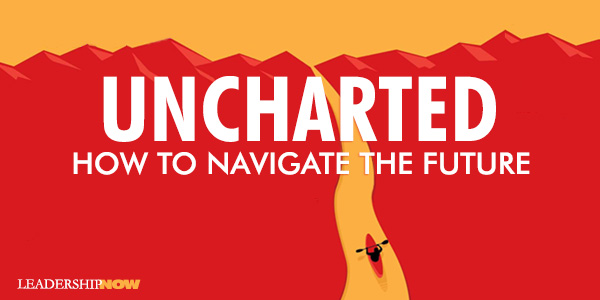 |
 |
12.15.20

Uncharted: How to Navigate the Future
PREDICTION has never been easy – or that accurate. Over and over again, forecasts and models fail us. And when they do, they won’t go away because the agenda behind them lives on. As a model or a forecast is designed to do, we become “recruited into an army of believers.” “The more we believe, the less we question,” says Margaret Heffernan. In Uncharted: How to Navigate the Future, she writes that “Overwhelmed with complexity, we seek simplification and too quickly reach for binary perspectives, just at the moment when we need broader ones.” How true. We crave certainty in a world that remains ambiguous. In an outstanding first chapter—False Profits—she reviews the work of three economic forecasters and the shortcomings and consequences of each. Forecasts and models are useful if they get you thinking, but only if we see them for what they are—propaganda.
Our past informs our present and future, but it can’t predict it. History, especially our personal history, defines a trajectory and provides us with probabilities. It tells us how we tend to react to what life throws at us, but we also have the capacity to learn and grow and change. New experiences shape us.
Believing that his history always repeats itself can lead to “blindness and blunder.”
Much of what she is talking about here defines the year 2020. So, if we can’t predict the future, what can we do? First, we can experiment more. In a time of crisis, we need to know more. We need to experiment. Experiments are an “antidote to helplessness or passivity. They set us on paths that reveal new knowledge and choices.” We can develop scenarios to “identify and test how and where the future and the present meet.” Different from experiments that “reveal immediate internal features of a complex system, scenarios explore where the internal organization meets the external environment, where uncertainties lurk beyond anyone’s control.” Scenario planning always surfaces conflict and there is always a moment when everything seems to fall apart. But getting the conflict out in the open, constructively, is crucial; it’s how and when people start to acknowledge and consider alternative perspectives. Third, we need to think like an artist. Artists think for themselves. They pay attention. Notice more. And then they let it sit—simmer, filter, distill, digest. Then they act. The only way to know if you are on to something is to start. I liked the phrase: “moving in and out of focus, trying to get a feel for something that doesn’t exist yet.” To have insights that are relevant to life requires having a life, one rich in experiences, and the time to internalize them. Fourth, think beyond. Start a Cathedral Project. Cathedral projects are unpredictable from the beginning. “They are destined to last longer than a human lifetime, to adapt to changing tastes and technologies, to endure long into the future as symbols of faith and human imagination.” They are also full of experiments making them “intrinsically, ambiguous, uncertain, and full of risk.” They attract brilliant minds because “the scale of their aspiration ensures that, instead of being passive victims of the future, they are actively involved in making it.” Imagination, creativity, compassion, generosity, variety, meaning, faith, and courage: what makes the world unpredictable are the same strengths that make each of us unique and human. Accepting uncertainty means embracing these as robust talents to be used, not flaws to be eliminated. 
Posted by Michael McKinney at 05:11 PM
|
BUILD YOUR KNOWLEDGE
 

How to Do Your Start-Up Right STRAIGHT TALK FOR START-UPS 
Grow Your Leadership Skills NEW AND UPCOMING LEADERSHIP BOOKS 
Leadership Minute BITE-SIZE CONCEPTS YOU CAN CHEW ON 
Classic Leadership Books BOOKS TO READ BEFORE YOU LEAD |